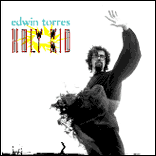 |
|
| lingo | |
| e-vents | |
| books | |
| sound | |
| about | |
| lobes | |
| contact | |
|
|
|
|
||||||||||||||||||||||||||||||||||||||||||||||||||||||||||||||||||||||||||||||||||||||||||||||||||||||||||||||||||||||||||||||||||||||||||||||||
 |
[ 1 ] [ 2 ] [ 3 ] [ 4 ] [ 5 ]
Holy Kid Kill Rock Stars, KRS 293, Produced by Edwin Torres, Jordan Trachtenberg Engineered at RetroMedia Studios, Red Bank, NJ
review by Josie McKee/The St. Marks Poetry Project Newsletter, Vol. 175 The incredibly rich and varied Holy Kid, provides an opportunity to focus on the work of Edwin Torres who is primarily known for his live performances. Working experimentally, Torres' performances are like broad sketches for a final work, providing continuity from performance to performance. Holy Kid is like a painting, a final product, yet wonderfully escapes generalization, because it is about the variety of ways an artist can exist in a place, by combining fragments, sounds and stories. Citing Kurt Scwitters as an influence, Torres embraces his philosophy that "one never knows." The focus on Scwitters' collage works is on how much fragments do, or don't touch. All is elusive, except for the degree of intimacy between parts. This creates a feeling of lightness; the work defies gravity and eliminates borders. Contact between parts in abstract art, visual or aural, intensifies its power: the desire of the viewer/listener to relate one to another. When Torres says "nor? YES!" in the piece entitled "A Page From The Flictionary Of Deafeningition," a hypnotic rift of countless contradictions amid a creamy musical float, the "yes," like touch, works as an agreement, a handshake, and then all is elusive again. We float from the clarity of yes, on a "raft ride," viewing non-words and actual ones on the horizon with equal interest. "Yes" is specific, positive, yet oddly intrusive in the flow. Where Torres parts from Scwitters, where he is in a place of his own creation replaying his cerebral history, it is wide open, and you can enter at any part. All the parts are familiar; the newness is in the sounds. What comes next is a modern knowledge that Torres shares with his listeners. While Schwitters worked during the "age of printed matter," incorporating ticket stubs and poster fragments into his collages, Torres works in an age of information, and in an entirely different political climate. While the sources of evil during Scwitters' time was clear, now passivity might be the adversary. "Frog boys," performed in a deep humming vibration, combines passivity with a departure from passivity; we drift through his piece due to the artful orchestration of Edwin Torres "falling between the crevice of apology and anger."
[ top ]
|



